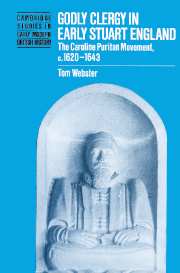Book contents
- Frontmatter
- Contents
- Acknowledgments
- List of abbreviations
- Introduction
- Part I Society, clerical conference and the Church of England
- 1 Clerical education and the household seminary
- 2 Profitable conferences and the settlement of godly ministers
- 3 Fasting and prayer
- 4 Clerical associations and the Church of England
- Part II The godly ministry: piety and practice
- Part III ‘These uncomfortable times’: conformity and the godly ministers 1628–1638
- Part IV ‘These Dangerous Times’: the Puritan Diaspora 1631–1643
- Index
- Cambridge Studies in Early Modern History
1 - Clerical education and the household seminary
Published online by Cambridge University Press: 04 November 2009
- Frontmatter
- Contents
- Acknowledgments
- List of abbreviations
- Introduction
- Part I Society, clerical conference and the Church of England
- 1 Clerical education and the household seminary
- 2 Profitable conferences and the settlement of godly ministers
- 3 Fasting and prayer
- 4 Clerical associations and the Church of England
- Part II The godly ministry: piety and practice
- Part III ‘These uncomfortable times’: conformity and the godly ministers 1628–1638
- Part IV ‘These Dangerous Times’: the Puritan Diaspora 1631–1643
- Index
- Cambridge Studies in Early Modern History
Summary
We can profitably begin a sketch of the life-cycle of the godly ministry at Cambridge. In what follows, I have focused on Emmanuel College, where John Preston was Master from 1622 to 1628, not because it was the only college to produce godly ministers but because it was the college which became identified with such ministers more than any other and because it was pre-eminent in the areas under study. I have paid little attention to the traditional areas of university histories, institutional details, social background and the structures of the curriculum, not least because we are ably served by other works. Here, I am principally concerned with extracurricular activities, ways in which students and prospective ministers were drawn into the social world of the godly ministry.
At the foundation of Emmanuel College in 1584, Walter Mildmay made quite clear the purpose he intended. He stressed that,
in establishing this College we have set before us this one aim of rendering as many persons as possible fit for the sacred ministry of the Word and the Sacraments; so that from this seminary the Church of England might have men who it may call forth to instruct the people and undertake the duty of pastors … Be it known therefore to any Fellows or Scholars who intrude themselves into the College for any purpose other than to devote themselves to sacred Theology and in due time to labour in preaching the Word, that they render our hope vain.
- Type
- Chapter
- Information
- Godly Clergy in Early Stuart EnglandThe Caroline Puritan Movement, c.1620–1643, pp. 15 - 35Publisher: Cambridge University PressPrint publication year: 1997



